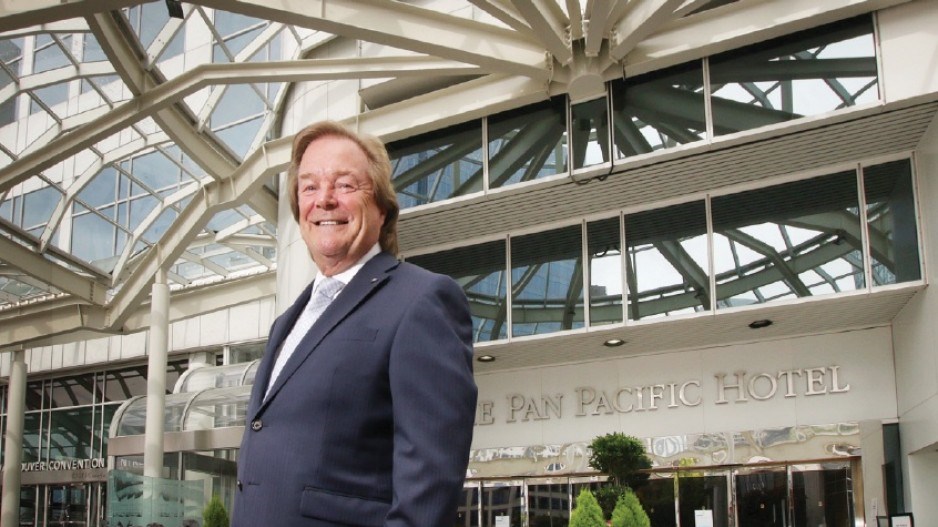Vancouver hotels are bracing for what could be a long road back to normal operations, when businesses in the sector can again muster sufficient occupancy to at least break even.
Travel advisories remain in effect for all countries, including a ban on non-essential travel for Americans. People may be reticent to travel even when restrictions are lifted, either because they fear getting the virus while abroad or because many insurance companies’ policies do not cover COVID-19 care for those who left on their vacations after mid-March.
The federal government’s recent ban on cruise ships docking at Canadian ports until at least October 31 deepened the wallop that downtown Vancouver hotels are likely to endure throughout the rest of the year.
“A lot of our market was the cruise business,” Pan Pacific Hotels & Resorts Vancouver general manager Gary Collinge told Business in Vancouver. “It was the convention business. We’re a group hotel, and that has pretty much dried up for 2020.”
Collinge said his hotel has stayed open throughout the pandemic in part because he did not think it would save much money to close, given the large building that his hotel is in, connected to Vancouver Convention Centre East.
The Vancouver Convention Centre told BIV that 129 events had been cancelled as of May 29, including conventions, trade and consumer shows and other meetings. About 382,000 people had been expected to attend those events, the convention centre said in an email.
Collinge called the loss in convention business “substantial.”
B.C.’s ban on gatherings with more than 50 people is unlikely to end soon, leaving Collinge skeptical that the convention business will return any time soon. He declined to estimate his hotel’s occupancy but said it was very low.
Other major Vancouver hotels, such as the Westin Bayshore Hotel Vancouver and the Fairmont Pacific Rim, have also remained open.
The Fairmont Hotel Vancouver, however, closed.
Its general manager, Adam Laker, told BIV that he closed the hotel to keep guests and employees safe during the pandemic and that he wanted to see how well the reopening of restaurants and pubs goes, before committing to a reopening.
His hotel has begun to take reservations starting July 1, but reopening on that date is not certain.
“We’re being honest with people by saying, ‘Look, if we’re not going to open, we’ll let you know,’” he said.
CBRE Hotels forecasts that the key industry metric of revenue per available room (RevPAR) will fall by 50% in 2020. In 2021, RevPAR is expected to be 20% below 2019 levels, according to CBRE. It does not see the hotel sector returning to pre-pandemic RevPAR until spring 2023.
“The easing of travel restrictions and social distancing guidelines is the first step to recovery in the hotel sector, but consumer confidence is critical and may take a long time, plus a vaccine, to revive,” said Brian Stanford, senior managing director of CBRE Hotels.
One piece of good news for Collinge is that Glowbal Restaurant Group owner Emad Yacoub intends to reopen his Five Sails Restaurant on June 15. That bistro is located at the Pan Pacific hotel and has been closed for several months.
Like hotels, restaurants in B.C. were never ordered to close. B.C. provincial health officer Bonnie Henry banned dine-in service until May 19, allowing only takeout service.
Yacoub has been vocal throughout the pandemic, urging the creation of a wage subsidy program before the Justin Trudeau government announced its plan.
While the federal government describes its program as providing employers with 75% of an employee’s wage, Yacoub said the funding really equates to 63% of the wage because employers remain on the hook to pay into programs such as the Canada Pension Plan and employment insurance.
He likes that Ottawa launched a rent-relief program under which it finances 50% of a business’ rent. Business owners pay 25%, and the landlord absorbs a 25% hit. Some of his restaurants do not qualify, however, because his monthly rent is more than the program’s $50,000 threshold.
Yacoub said his landlords have also opted not to take part in the program, instead casually allowing Yacoub to defer some of his rent, but not wanting to put new lease agreements in writing.
He is urging the City of Vancouver to provide property tax relief and for the provincial government to do more, particularly given that Victoria went ahead with its June 1 minimum-wage hike.
Yacoub said it would be a game changer if the B.C. government were to allow restaurant owners to buy alcohol at a wholesale price.
BIV asked Premier John Horgan at a press conference last week if his government is considering allowing restaurants to buy alcohol at wholesale prices and he said that he expects Attorney General David Eby to bring the matter to cabinet for discussion.
Yacoub has laid off about 650 of his 850 staff, but he said that buying alcohol at a wholesale price would enable him to bring back at least 50 workers.
“If our company can’t make it, then nobody can make it, because we have accounting backgrounds,” he said. “We are watching every penny everywhere.” •




